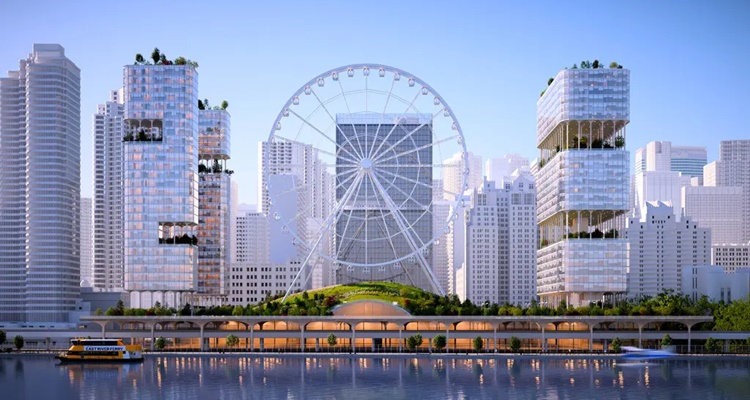On January 31, the Soloviev Group, a Canadian holding company with roots in many business categories and chaired by Stefan Soloviev, announced that it will unite with Mohegan, formerly Mohegan Gaming & Entertainment, a Connecticut-based casino operator, to support its bid to obtain a license to build the first Vegas-style casino in Manhattan on a long-vacant site.
The main goal of the partnership:
The main reason for the partnership was that Soloviev Group participates in the competition for one of the 3 casino licenses for the wider New York area, which the state regulator will award.
The company joins a growing field of providers that will partner with casino operators in deals that involve Coney Island in Brooklyn, Hudson Yards and Times Square in Manhattan, Willets Point in Queens and Nassau County on Long Island, among others.
However, the Soloviev Group was in no hurry to declare its alliance with Mohegan.
In this regard, Ray Pineault, president and chief executive of Mohegan, said: “Discussions about the site only began a few weeks ago and my firm had been approached by other casino bidders.”
Layout of the proposed casino:
After more than two decades of trying to build said casino, the Soloviev Group’s newest bid for the casino could come to fruition on a 6.5-acre parcel close to the United Nations headquarters in Midtown, which the Soloviev Group has long owned.
However, this site was previously part of the erstwhile Con Edison power plant that flanked the East River, from East 38th to 41st Streets at First Avenue.
Regarding the location, Michael Hershman, the chief executive said: “There really is a lack of hotel rooms, retail and restaurants in this stretch of Midtown East.
“The plan, called Freedom Plaza (pdf), would bring a number of amenities. This is beyond a casino.”
The joint casino, which is tied by a mostly underground casino, will offer a 1,200 -room hotel, two residential towers, a museum committed to democracy and four acres of green space that will house a large Ferris Wheel, according to Mr. Hershman.
Company officials added that museum “will showcase giant slabs of the Berlin Wall and draw on the developer’s extensive private art collection.”
However, regarding the reason behind the decision to put most of the casino underground, Mr. Hershman said: “The reason for it is to reserve about four acres of open space for public sports fields, walking paths and other amenities in an area that has little greenery.
“The residential towers, depicted in renderings with swooping carve-outs for trees and green space, could have 1,400 to 1,500 new rental and condo apartments, an undecided portion of which would be offered below market rent.”
Many obstacles:
In his intention to start the construction of said casino, Sheldon H. Solow, the founder of the company now known as the Soloviev Group, and his partner bought the 9,2 hectare site in 2000 for $630 million.
Obstacles such as the separation of partners, the sale of part of the property and introduction of the necessary corrections to the location plan appeared already at the beginning.
However, it all paid off when Mr. Solow received legal approval to proceed with the project, which included 3 residential towers and an office building.
But only then did obstacles arise: community opposition to earlier repetitions of the project, a downturn in the real estate market, a collapse of the office market during the pandemic and Mr. Solow’s death in 2020 at the age of 92, leaving his son, Stefan Soloviev, to take over the company.
The competition will be tough for the Soloviev Group, especially since the company is already facing another obstacle. Namely, Kyle Athayde, the chair of Community Board 6 in Manhattan, said that “his group is very opposed to a plan that includes a casino and entertainment and remains suspicious of the net benefits, including the housing component and green space.”
He added: “These are really Trojan horses to get the casino through. The opening of a major commercial complex in a largely residential area would be too disruptive.”
In this regard, Mr. Hershman, said: “The site’s proximity to major roads, ferry access and a 10-minute walk to Grand Central Station make the location ideal for the project.”
Mr. Athayude added: “When the General Assembly of the United Nations, and its cavalcade of diplomats, snarls traffic along First Avenue.”
Tough competition:
Some of the contenders include:
- SL Green Realty Corp’s partnership with Caesars Entertainment for a Times Square casino,
- Related Companies partnership with Wynn Resorts for a many-use site with a casino in the west half of the train stations,
- Steven A. Cohen, owner of the Mets, plans to open a casino in the parking lot next to Citi Field in Queens,
- Thor Equities has bid for a casino license to turn part of Coney Island into a casino,
- Las Vegas Sands has bid for a casino license to open a casino in the site of the Nassau Veterans Memorial Coliseum in Long Island,
- Hudson’s Bay Company proposal to transform the upper floors of its leading store into a high-roller casino.
But among the competitors are two existing horse racing and digital gambling operations in Queens and Yonkers, which are trying to get full casino licenses that involve table games and live dealers.
The wait for a decision will be long:
The Gaming Facility Location Board, the state regulator, is slated to make a decision on the winning bids in late 2023. However, the entire process could be delayed much longer, due to complex land-use questions and a lengthy community feedback process.
To qualify, each iGaming company must make at least $500 million in capital investment and the winners will have to individually pay at least an additional $500 in gambling license fees.



